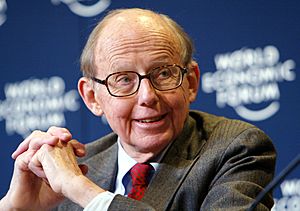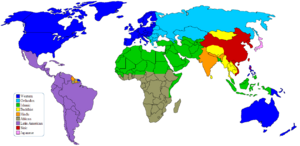Samuel P. Huntington facts for kids
Quick facts for kids
Samuel P. Huntington
|
|
|---|---|

Huntington in 2004
|
|
| Born |
Samuel Phillips Huntington
April 18, 1927 New York City, U.S.
|
| Died | December 24, 2008 (aged 81) Martha's Vineyard, Massachusetts, U.S.
|
| Education | Yale University (BA) University of Chicago (MA) Harvard University (PhD) |
| Political party | Democratic |
| Spouse(s) |
Nancy Arkelyan
(m. 1957) |
|
Notable work
|
Political Order in Changing Societies (1968) The Clash of Civilizations and the Remaking of World Order (1996) |
| Scientific career | |
| Institutions | Harvard University Columbia University |
| Thesis | Clientelism: A Study in Administrative Politics (1951) |
| Doctoral students |
|
| Influences | Zbigniew Brzezinski Feliks Koneczny (disputed) |
| Influenced |
|
Samuel Phillips Huntington (April 18, 1927 – December 24, 2008) was an American expert in political science. He was also an adviser and a university professor. He taught at Harvard University for over 50 years. There, he led Harvard's Center for International Affairs.
During the time Jimmy Carter was president, Huntington worked for the United States National Security Council. He helped plan security for the White House. He is most famous for his 1993 idea called the "Clash of Civilizations". This idea was about the world after the Cold War.
Huntington believed that future wars would happen between different cultures, not just between countries. He thought that extreme groups from the Islamic world would become a big challenge to Western power. He also helped shape American ideas about how the military and government work together.
Contents
Early Life and Education
Samuel Huntington was born in New York City on April 18, 1927. His mother, Dorothy Sanborn, wrote short stories. His father, Richard Thomas Huntington, published magazines for hotels.
He finished college at Yale University when he was 18. He then served a short time in the United States Army. He earned his master's degree from the University of Chicago. Later, he got his PhD (a very high degree) from Harvard University. He started teaching at Harvard when he was only 23 years old.
Academic Career and Key Ideas
Huntington taught in Harvard's government department starting in 1950. In 1959, he moved to Columbia University in New York. He taught there for three years. He also helped lead their Institute of War and Peace Studies.
In 1963, Harvard asked him to come back as a full professor. He stayed at Harvard until he passed away. He also helped start and edit a magazine called Foreign Policy.
Understanding Military and Government
Huntington's first important book was The Soldier and the State: The Theory and Politics of Civil-Military Relations (1957). This book talked about how the military and civilian government should work together. It was a new idea at the time. Today, it is seen as a very important book on this topic.
Political Order in Changing Societies
In 1968, Huntington published Political Order in Changing Societies. This book looked at how countries change as they become more modern. He argued that if a country modernizes too quickly without strong political rules, it can lead to violence. He believed that strong institutions were needed to manage these changes.
Huntington also advised different governments. He believed that sometimes, a government might need to be very strong to make big changes.
The Third Wave of Democracy
In his 1991 book, The Third Wave: Democratization in the Late Twentieth Century, Huntington wrote about a big change in the world. He said that starting in 1974, many countries became more democratic. He called this a "third wave" of democracy. More than 60 countries in Europe, Latin America, Asia, and Africa became more democratic during this time. This book won him an award in 1992.
The Clash of Civilizations
In 1993, Huntington wrote an article called "The Clash of Civilizations?". This article caused a lot of discussion. He later turned it into a book in 1996, called The Clash of Civilizations and the Remaking of World Order.
His main idea was that after the Cold War, conflicts would be more about culture than about political ideas. He said the world had several main "civilizations." These included Western, Islamic, Chinese, Hindu, and Japanese cultures, among others. He believed that differences between these cultures would lead to future conflicts.
Huntington argued that Western countries needed to understand these cultural differences. He felt they should not try to force their ideas of democracy on everyone. He wrote that Western belief in its culture being for everyone was "false," "immoral," and "dangerous."
Some people disagreed with Huntington's ideas. They said his view was too simple. They also argued that he ignored other reasons for conflict, like poverty or leaders' actions. However, his ideas became more popular after the September 11 attacks.
Who Are We? And Immigration
Huntington's last book, Who Are We? The Challenges to America's National Identity, came out in 2004. In this book, he wrote about what it means to be American. He worried that large numbers of people moving to America from Latin American countries could change American culture.
He suggested that immigrants should learn English and adopt American traditions. Some critics strongly disagreed with this book. They said it was not based on good research and was meant to cause division.
Personal Life
Samuel Huntington met his wife, Nancy Arkelyan, while they were working on a speech for a presidential candidate in 1956. They had two sons, Nicholas and Timothy.
After being ill for several years, Huntington passed away on December 24, 2008. He was 81 years old and died in Martha's Vineyard.
Selected Publications
- The Soldier and the State: The Theory and Politics of Civil-Military Relations (1957)
- The Common Defense: Strategic Programs in National Politics (1961)
- Political Order in Changing Societies (1968)
- The Crisis of Democracy: On the Governability of Democracies with Michel Crozier and Joji Watanuki (1976)
- American Politics: The Promise of Disharmony (1981)
- The Third Wave: Democratization in the Late Twentieth Century (1991)
- The Clash of Civilizations and the Remaking of World Order (1996)
- Who Are We? The Challenges to America's National Identity (2004)
As editor:
- Culture Matters: How Values Shape Human Progress with Lawrence E. Harrison (2000)
- Many Globalizations : Cultural Diversity in the Contemporary World with Peter L. Berger (2002)
See also
 In Spanish: Samuel P. Huntington para niños
In Spanish: Samuel P. Huntington para niños
- Clash of civilizations
- Civil-military relations
- International relations theory
- Modernization theory
- Political geography
- Western civilization
 | Emma Amos |
 | Edward Mitchell Bannister |
 | Larry D. Alexander |
 | Ernie Barnes |


